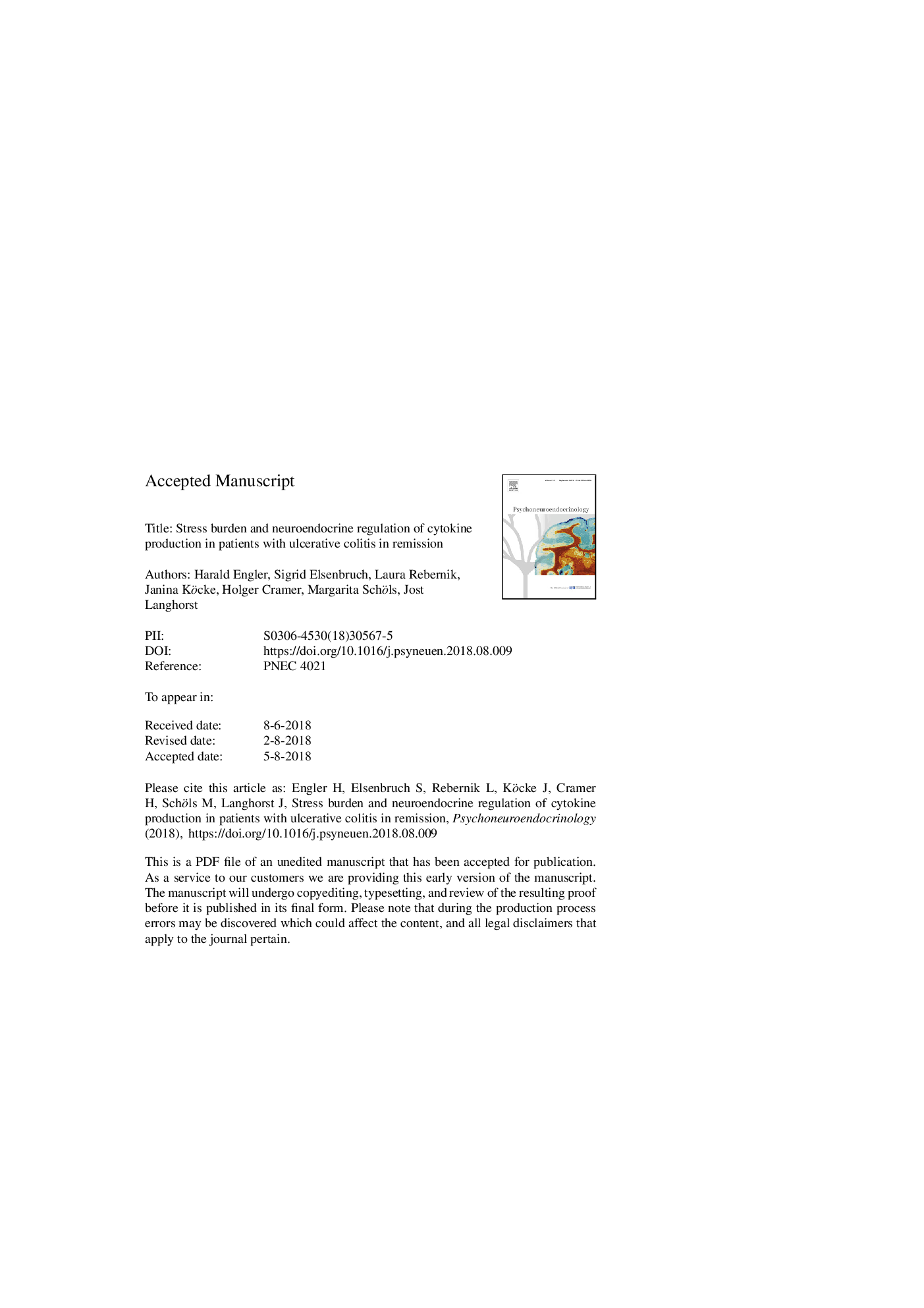| کد مقاله | کد نشریه | سال انتشار | مقاله انگلیسی | نسخه تمام متن |
|---|---|---|---|---|
| 11002042 | 1433945 | 2018 | 23 صفحه PDF | دانلود رایگان |
عنوان انگلیسی مقاله ISI
Stress burden and neuroendocrine regulation of cytokine production in patients with ulcerative colitis in remission
ترجمه فارسی عنوان
فشار استرس و تنظیم نروندوکریین تولید سیتوکین در بیماران مبتلا به کولیت زخمی در بهبودی
دانلود مقاله + سفارش ترجمه
دانلود مقاله ISI انگلیسی
رایگان برای ایرانیان
کلمات کلیدی
موضوعات مرتبط
علوم زیستی و بیوفناوری
بیوشیمی، ژنتیک و زیست شناسی مولکولی
علوم غدد
چکیده انگلیسی
Stress demonstrably contributes to disease course in patients with inflammatory bowel diseases but the underlying mechanisms remain elusive. Here, we investigated if neuroendocrine regulation of pro- and anti-inflammatory cytokine production by peripheral blood immune cells is altered in patients with ulcerative colitis in remission (UCR). Using a whole blood stimulation assay, we measured the sensitivity of lipopolysaccharide (LPS)-induced TNF-α and IL-10 production to the glucocorticoid receptor agonist dexamethasone (DEX), the β2-adrenergic receptor agonist terbutaline (TERB), and the α7-nicotinic acetylcholine receptor agonist 3-[2,4-dimethoxy-benzylidene]-anabaseine (GTS-21) in UCR patients (N = 26) and in healthy controls (HC, Nâ=â25). Additionally, we assessed anxiety and depression symptoms as well as chronic perceived stress and disease-specific quality of life. Results showed that UCR patients exhibited greater anxiety, depression and chronic stress levels than HC, and reduced disease-specific quality of life. Plasma concentrations of TNF-α, IL-8, C-reactive protein (CRP) and lipopolysaccharide binding protein (LBP) were significantly higher, while LPS-induced IL-10 production was substantially lower in UCR compared to HC. Independent of group, DEX and GTS-21 dose-dependently inhibited TNF-α and IL-10 production, whereas TERB inhibited TNF-α and upregulated IL-10 production. However, at higher TERB doses (i.e., stress levels), upregulation of IL-10 production was significantly diminished in UCR compared to HC. Together, these findings demonstrate that downregulation of pro-inflammatory cytokine production in peripheral blood immune cells through glucocorticoid, adrenergic, and cholinergic mechanisms is essentially normal in UC in clinical remission and as efficient as in healthy individuals. However, UCR patients exhibited signs of systemic low-grade inflammation and dysregulation of anti-inflammatory IL-10 production. Impaired adrenergic upregulation of IL-10 production during remission could be one mechanism how stress facilitates relapse and conversion to symptomatic disease in these patients.
ناشر
Database: Elsevier - ScienceDirect (ساینس دایرکت)
Journal: Psychoneuroendocrinology - Volume 98, December 2018, Pages 101-107
Journal: Psychoneuroendocrinology - Volume 98, December 2018, Pages 101-107
نویسندگان
Harald Engler, Sigrid Elsenbruch, Laura Rebernik, Janina Köcke, Holger Cramer, Margarita Schöls, Jost Langhorst,
